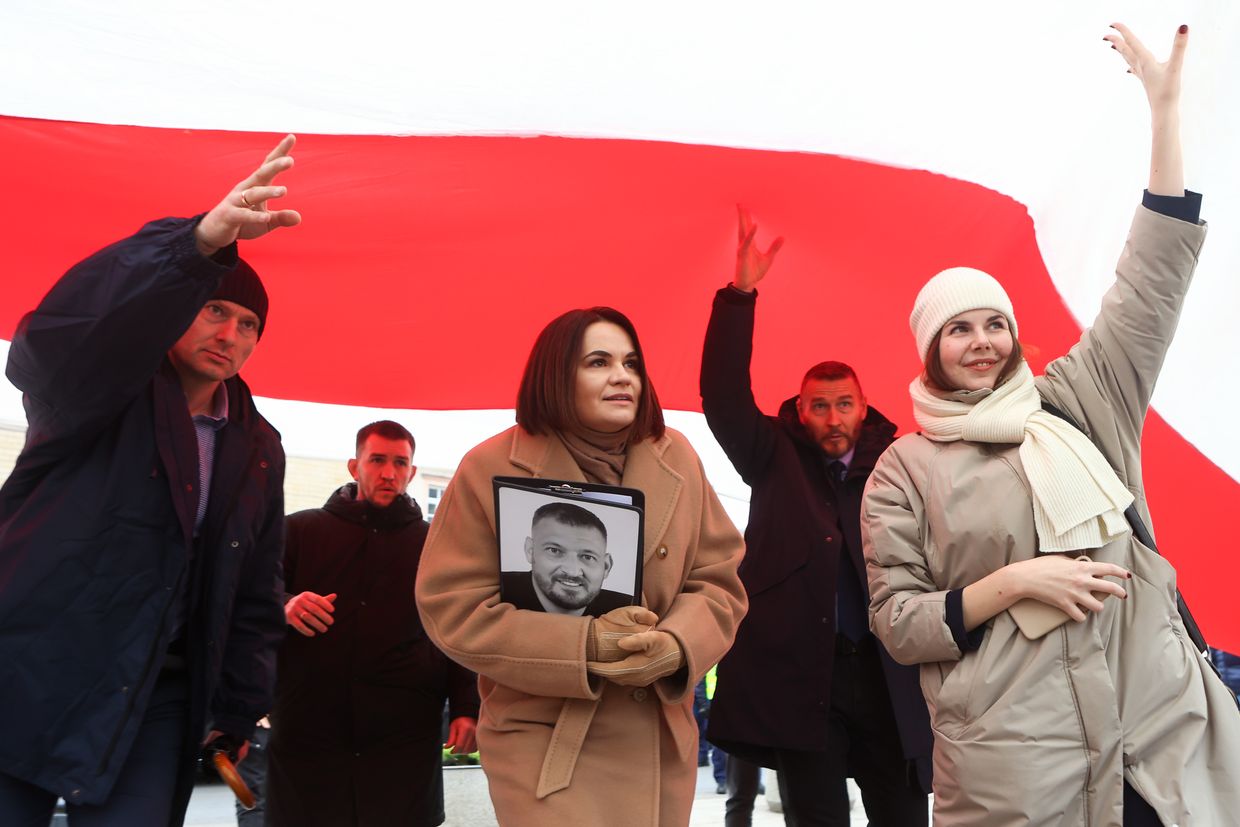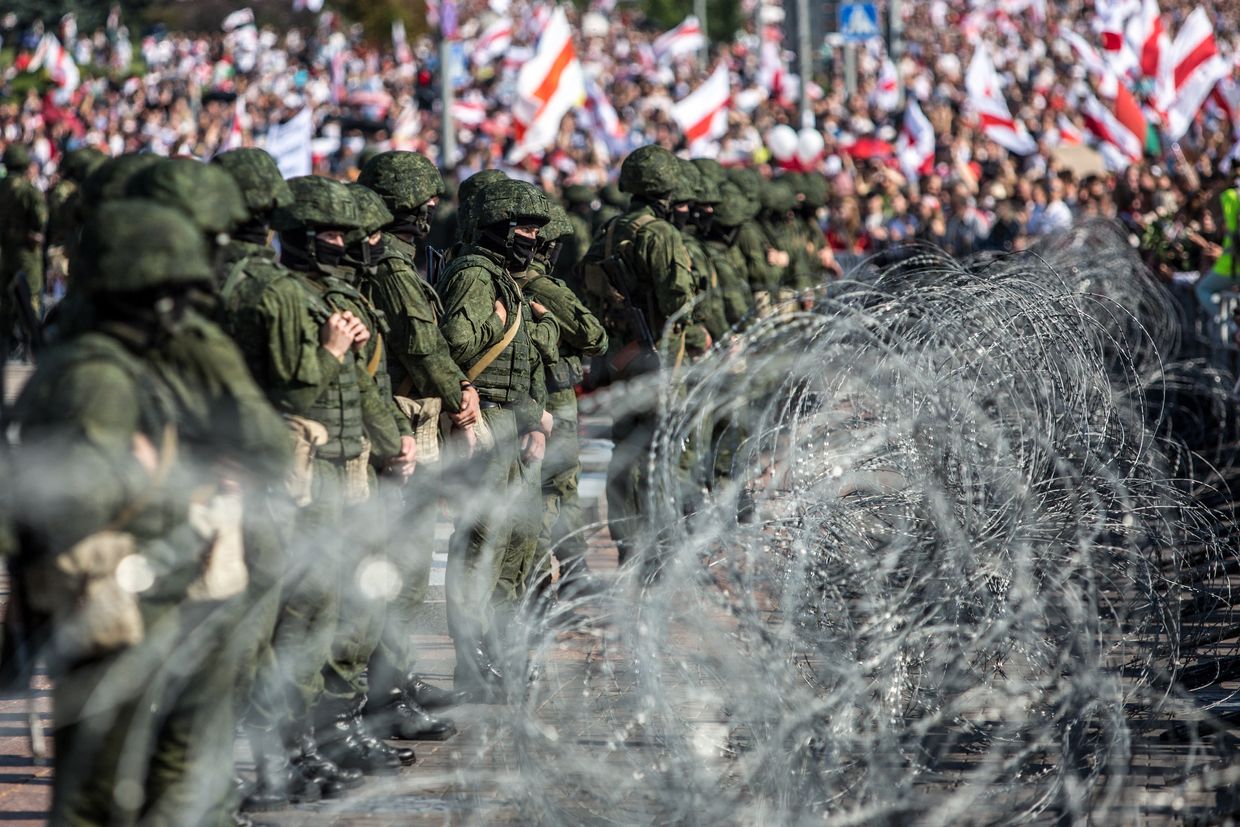Kidnapped Belarusian soldier fighting for Ukraine paraded on Belarusian state-controlled television

Belarusian border guards patrol along the frontier near the Divin border crossing point between Belarus and Ukraine in the Brest region. Feb. 15, 2023. (NATALIA KOLESNIKOVA/AFP via Getty Images)
Branded a terrorist by Belarusian dictator Alexander Lukashenko’s regime for taking part in Ukraine’s fight against Russia, Vasyl Verameichyk was paraded on state-controlled television in late January for a two-part interview titled "Confessions of a Militant."
During the so-called interview, Verameichyk spoke of plans for an alleged incursion into Belarus, similar to the Ukrainian military's operation in Russia’s Kursk Oblast.
Verameichyk also acknowledged some of the challenges he faced during his military service in Ukraine, which Belarusian state-controlled television tried to distort and use to portray Ukrainian military life as rife with drug abuse, corruption, and a pervasive fear of death by the hands of one’s own fellow soldiers.
After being arrested in Vietnam in November, Verameichyk was swiftly extradited to Belarus. It is believed that he was targeted in a coordinated operation by Lukashenko’s security services for having served in the Kastus Kalinouski Regiment of Belarusian volunteers fighting for Ukraine.
“It seems to me that the regime is using all of this for the domestic audience. They need to create the impression that everything around them is chaos, war, and destruction — that only Lukashenko can ‘save’ them,” volunteer and journalist Maria Malyavko, a longtime friend of Verameichyk, told the Kyiv Independent.
Belarusian volunteers in Ukraine have been attempting to rally Kyiv to help facilitate Verameichyk’s freedom.
While Malyavko and others who know Verameichyk were relieved to see new footage of him alive, their relief is tempered by the harsh reality that as long as Verameichyk remains in Belarusian custody, his life and health remain at risk.
Incursion
The Belarusian regime's media frenzy focused primarily on the revelation of a supposed plan for the Kastus Kalinouski Regiment, assisted by Ukrainian and other European intelligence services, to launch an offensive and seize part of Belarusian territory — mirroring Ukraine's ongoing actions in Russia’s Kursk Oblast.
Verameichyk’s time serving in the Kastus Kalinouski Regiment was reportedly cut short by a dispute with a staff officer that temporarily prevented him from reentering Ukraine, although those who served alongside him said he was looking for ways to return to the front.
“I am aware of the existence of a classified part of the strategy for the liberation of Belarus — secret protocols that outline specific actions and possible scenarios,” Verameichyk told the state propagandist conducting the interview.
“This is a set of measures developed with the assistance of serious organizations, Western intelligence agencies, the intelligence services of Lithuania, Poland, and, of course, the SBU, aimed at using armed force to seize a certain territory of Belarus.”
Specifically, Verameichyk pointed to the border town of Malaryta, situated in Belarus’ western Brest region near the borders of Poland and Ukraine. For some Belarusian exiles who watched the interview, this only added to the spectacle.
“Vasyl didn’t say anything unexpected for us, except for the ‘plans to capture Malaryta,’’” Malyavko said.

“This topic has been so meme-worthy for a long time that it sounded more like mocking the Belarusian regime, who are going through a severe creative crisis.”
The bizarre tone of the interview was further marked by mentions of foreign fighters supporting the regiment in its alleged incursion into Belarus.
Both the Belarusian and Russian governments regularly label foreign fighters in Ukraine as "mercenaries," a narrative spread through state-controlled media to reinforce the claim that the West aims to destabilize their so-called region of interest.
Propagandists also pressed Verameichyk on internal conflicts within the Kastus Kalinouski Regiment, pointing to drug use, though Veremeychyk only acknowledged alcohol and marijuana consumption among some of those serving in the regiment.
He further discussed the disconnect between the staff based in Kyiv and those serving on the front lines — an issue that is not unique to the regiment but has been observed across the military as a whole.
Verameichuk was also asked about the medal he was awarded by Ukraine's military intelligence for his role in coordinating the evacuation of more than 60 Ukrainian soldiers from encirclement near Oleksandrivka in Ukraine’s southern Mykolaiv Oblast.
He replied that while he never wore the medal, he accepted it "with pride," a reply that Belarusian state-controlled television characterized as his attempt to "distance" himself from the honor.
The Kastus Kalinouski Regiment didn’t respond to the Kyiv Independent’s request for comment on what was said by Verameichyk, only clarifying that “a person who is effectively being held hostage by Lukashenko’s authorities may and will say whatever is demanded of them.”
In need of a miracle
Although Belarus has not officially joined the full-scale war, it actively supports Russia by serving as a strategic hub for Russian military operations. As a result, Lukashenko’s regime has designated the soldiers serving in the Kastus Kalinouski Regiment as members of a terrorist organization.
At the end of the state propaganda film showcasing the capture of Verameichyk in November, the head of Belarus’ security service declared to the camera that Belarusians fighting alongside Ukraine "should live with the knowledge that Belarus will find them, no matter where they are in the world."
Those who know Verameichyk and served alongside him emphasize that, as a captive of Lukashenko’s regime, he was essentially forced to perform for the camera.
“The interview turned out to be quite soft. Most of the information had already been mentioned by other Belarusian volunteers in opposition media,” Andrei Kushnerau, a Belarusian soldier who is currently serving in the Da Vinci’s Wolves battalion, told the Kyiv Independent.
“Vasyl handled himself very well, especially considering that he is in captivity.”
“Such ‘interviews’ are typically watched to read between the lines, to observe how the person comes across, since there's no other connection — it has to be done consciously and with a clear mind,” Malyavko added.
Kushnerau, alongside other Belarusian volunteers, has been actively lobbying Kyiv to facilitate a prisoner exchange with Minsk aimed at securing the release of Verameichyk, given that the regime's targeted campaign against him stems from his role in the fight for Ukraine’s freedom.

“However, the Ukrainian side has still done nothing to help the person who fought for its freedom,” Kushnerau said.
The President’s Office did not respond to the Kyiv Independent’s request for comment.
While the timeline for securing Verameichyk's freedom remains uncertain, his friends and fellow soldiers refuse to give up. Instead, they continue to amplify his case, steadfast in their resolve to ensure his plight is not forgotten, holding onto hope that they’ll see him again, however elusive it may sometimes seem.
“In connection with Vasily's story, I feel like speaking out and shouting: have respect for soldiers!” Malyavko said.
“These are people who take on enormous burdens at the front, and we must carry their burden in civilian life. Unfortunately, we are so far away that we can’t help him (directly). And now, almost a miracle is needed to make it possible.”
Note from the author:
Hi, this is Kate Tsurkan. Thank you for taking the time to read this article. The Belarusian people's struggle for a better future is ongoing, especially as the Lukashenko regime continues to target innocent individuals. We must also remember amid all this the many Belarusian soldiers risking their lives to defend Ukraine against Russian aggression — they don't get enough coverage but deserve our recognition and support. If you found this story important please consider supporting our reporting.













